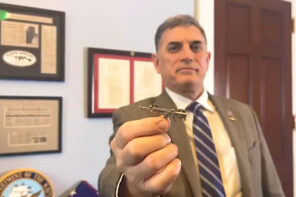Something about America died this summer. We should grieve its end.
What exactly has passed away? From where progressives sit, that’s easy: It’s the illusion that the nation could transition easily from conservative governance to liberal.
That idea has been going down hard for weeks as right-wing mobs (often made up of Republican activists subsidized by the insurance industry, posing as concerned members of the grass roots) have fanned out across the nation, trying to disrupt the town hall meetings of Democratic members of Congress.
It took another heavy hit with lurid accusations of government support for euthanasia and the flat-out lie about “Obama’s death panels” told by former Alaska Governor Sarah Palin and echoed by too many crackpots to name.
But the notion that we as a nation could make a civil change in direction finally gave up the ghost when a protester in Portsmouth, New Hampshire, showed up with a pistol strapped to his leg and a sign calling for the refreshment of the tree of liberty with the blood of tyrants.
That was a patriotic sentiment in revolutionary times. Now it’s just a vile form of sour grapes. That an election went against the conservative movement does not mean that it was unfair, or undemocratic, or oppressive. In this nation, we stick together—win or lose.
But that, I think, leads us to what conservatives have lost.
Year upon year, starting with Rush Limbaugh and only accelerating with Bill O’Reilly, Glenn Beck, Michael Savage, Ann Coulter, and Michelle Malkin (among many others), conservatives have been told by their thought leaders that the liberal perspective is illegitimate; that it is wrong and dangerous and un-American and evil.
More to the point, they have been told that liberals are not needed. They have been told that the nation would be better off without anyone to the left of Ronald Reagan; that an America with a particular construct of traditional social mores, an adventurous military, and an unfettered corporate capitalism could keep them safe and happy. Liberals, the story goes, only serve to disrupt the good life people could have under a free conservative hand.
This has been a monstrous lie. These promises could never be kept.
We can say, following Buber, that the myth of eliminationism is a delusion; which does not mean that its proponents are deluded, only that “with their speech they breed ‘delusion’ in their hearers, they spin illusions for them.” It is not strictly true that liars believe one thing and say another, as Buber argues. Often enough, as with sexual peccadilloes, this is the case.
But many times, the liars believe the falsehood themselves, or at least half-believes. Phillip Leon writes, “The self-deceiver does not believe… what he says or he would not be a deceiver. He does believe what he says or he would not be deceived. He both believes and does not believe… or he would not be self-deceived.” Given the choice between uttering a falsifiable assertion and accepting a truth that does not support their moral and political commitments, they choose the lie every time.
Those are the people who spread the lies. Those who accept them—the recipients of talking points and talk-show smears—are likewise conflicted. As Dave Neiwert notes, this is an unhealthy trait in a modern democracy, and as Fred Clark adds, it’s one that takes a great deal of energy to maintain.
To be sure, conservatives are not alone in embracing the false promises of conformity, security, and prosperity. Many liberals cheered on the invasion of Iraq. Many of them invested in the stock market. And yes, liberals know a thing or two about smugness.
But conservatives are unique in having been told again and again that the promises of our society have failed not because they are inherently undeliverable, but because liberals have betrayed them. An entire generation has come to believe this. Now that generation is faced with a nation that not only tolerates progressive ideas, but embraces them.
I say that not to shove it in conservatives’ faces, but to recognize the depth of their loss. They can no longer remain unfeeling about American brokenness. From their perspective, the very people who have caused it now run the place.
Douglas Harrison attributes conservatives’ vertigo to their loss of privilege, which is a perfectly acceptable argument. But the problem is more complex; it goes deeper. What has been lost is not privilege, but the assumption and illusion of privilege and its attendant power. This provokes intense psychic conflict and pain.
This is not simply psychological. It becomes what we used to call an existential crisis. Buber tells us of liars by way of exegeting Psalm 4:
Instead of completing their fellow-man’s experience and insight with the help of their own, as is required by men’s common thinking and knowing, they introduce falsified material into his knowledge of the world and of life, and thus falsify the relations of his soul to being. Second, they speak with a double heart, literally with ‘heart and heart.’ In order that the lie may bear the stamp of truth, the liars as it were manufacture a special heart, an apparatus of naturalness, from which lies well up to the ‘smooth lips’ like spontaneous utterances of experience and insight.
Duped or dupers, these people are literally brokenhearted to begin with. Now the facade has been torn away, and they have no idea which way to turn. Their “experience and insight” means nothing. They no longer know how to be in a world that refuses to confirm falsehood. They have been lied to, and they know it. They have nowhere to go but deeper into the lie, and they know that too. No matter which path they choose, it is rough and difficult and threatening. Their leaders at least have the consolation of a fat paycheck. The ordinary people manning the tea parties and birther rallies and storming town hall meetings don’t even have that much to cling to.
Some, not all, of them have reacted with fear, anger, and even violence. But the loss of privilege is shared, as is the loss of the belief that they could go it alone. So they reach for the familiar liturgy of outrage; sometimes weaponized. They lash out in their pain and confusion.
As satisfying as it is to see the conservative movement come apart at the wheels, liberals should not pride themselves on puncturing right-wing certainty. We embrace negativity too. We, too, may succumb to the temptations of separatism. As brilliant as it is to watch Barney Frank shut down extremist hecklers, in the long run, avoiding the risk of connection to broken people is not helpful.
This perilous moment in the life of our collective enterprise is not a time to meet division and hostility with more of the same. It is a time to surround one another with compassion; to recognize the real pain and discomfort of others; and to welcome them with open arms into the shared project of finding freedom, justice, and power together.
That, as I always say, does not mean surrendering core principles or compromising them away. The truth, after all, is the truth.
But I would love to see a sign at the next health care town hall meeting declaring WE SHARE YOUR PAIN AND WE NEED YOUR HELP. I would love to see Barney Frank or any other Congressperson say to a protester, “I will not allow you to disrupt this meeting out of consideration for the other citizens who have come here to engage in the democratic process. But I grieve with you the simpler days that we seem to have lost. What are you afraid of, and how can we address your fears?” That, it seems to me, is the only way we are going to change the dreadful national script we have written for ourselves this summer.
Buber has a final word for the puppet masters suborning violence this summer, however:
All this is the work of the mighty, in order to render tractable by their deceits those whom they have oppressed. Their tongues maintain them in their superiority. They ‘speak great things’ and by the speaking bind their bondslaves still more to them. And if they guess that rebellion is stirring in the minds of the oppressed and the hope awakening that ‘the Lord is with us!’, then they answer themselves ‘Our lips are with us, who is lord over us?’
Free speech and AR-15s are one thing, but the debates of this August begin to take on the character of ultimate things. The lie is not real. Its power, no matter how thuggishly supported, cannot last forever. That message needs to be heard by those who speak the lies and those who hear them alike.




